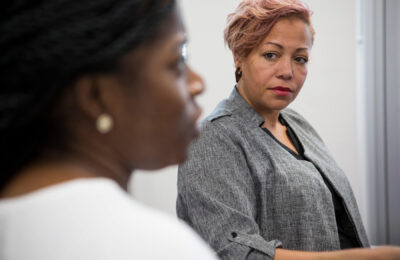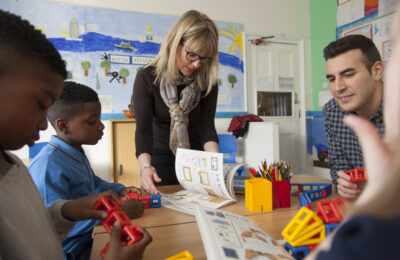Lisa Bostock
Deputy Director for Research and Senior Lecturer
Dr Lisa Bostock is Deputy Director for Research within the Child, Community and Educational Psychology (M4) professional doctorate. She is also Senior Lecturer for the Advanced Practice and Research: Social Work and Social Care (D55) professional doctorate. Lisa was previously Associate Professor at the University of Bedfordshire and remains active in practice-focused research.
Lisa’s research focuses on therapeutically informed approaches to child welfare, specifically systemic social work practice. She has published extensively on inter-professional working, investigating why some aspects of multi-disciplinary working embed better than others to improve outcomes and experiences of people using services. Lisa is particularly interested in the containing role of group-based supervision to support staff at all levels practice more effectively, promote inclusively and reduce uncertainty and associated work-related anxiety.
She has a special interest in the role of digital technology to support practice improvement for service users and carers. Lisa co-produced an early example of an interactive online manual for the Anna Freud Centre, to support services and set up an Early Years Parenting Unit (EYPU) for parents with personality difficulties whose children are at risk of entering the care system.
Launching in 2026, Lisa lead co-development of an innovative web app designed to enhance organisational and personal resilience in health and social care with Dr Louise Grant, Professor Gail Kinman and Research in Practice.
Qualifications
- PhD Applied Social Science, Lancaster University, ESRC/Barnardo’s CASE award, 1994-1998
- BA (Hons) Sociology with Social Policy (1:1), 1991-1994
- Lisa is a certified Schwartz Round™ facilitator
Teaching roles
- Research module lead, professional doctorate in Child, Community and Educational Psychology (M4)
- Year two lead, professional doctorate in Advanced Practice and Research: Social Work and Social Care (D55)
- PhD/Professional doctorate supervisor and examiner
Research interests
- Group-based approaches to reflective practice, including:
- group supervision
- reflective practice groups
- Systematically informed social work practice
- Inter-professional working
- Practice-near research, participatory research and evaluations
- Role of digital technology to support practice improvement
Current research projects
Department for Education:
- co-leading pilot of the STAR tool for assessing the quality of supervision developed by Lisa with Dr Louise Grant and Research in Practice, designed to reduce unnecessary social worker workload through improving the quality of supervision.
Recent research projects
National Institute of Health Research (NIHR) national evaluation of the multi-agency child safeguarding reforms:
- leading co-production of a theory of change and associated monitoring, evaluation and learning framework for local child safeguarding partnerships (LSCPs).
NHSE projects to:
- co-produce an innovation web app called the iSort (integrated systemic organisational resilience toolkit) to support organisational and personal resilience via evidence-based workforce wellbeing strategies
- co-facilitate and evaluate reflective practice groups (RPGs) with senior leaders across health, social care and education to embed inter-professional reflexivity, reduce professional anxiety and promote anti-racist practice
Lisa was Principal Investigator (research leader) for a series of evaluations within the Department for Education Children’s Social Care Innovation Programme, including:
- Scaling and deepening the Reclaiming Social Work (RSW)
- Scaling and deepening the RSW model: longitudinal follow up
- Family Safeguarding Hertfordshire (FSH)
- Havering Face to Face Pathways (F2FP)
During the height of the pandemic, she worked with the Big Lottery-funded Contextual Safeguarding programme to support five local authorities implement contextually-informed approaches to safeguarding young people in the community.
Lisa is a certified Schwartz Round™ facilitator. She co-led implementation of Schwartz@Beds for student nurses, social workers and trainee paramedics to come together to discuss the emotional impact of their training.
Expert advisory roles
Lisa has held the following research ethics leadership roles:
- Chair of the Institute for Applied Social Research Ethics Panel (2018-2024)
- Leading implementation of research governance arrangements for the Centre of Expertise on Child Sexual Abuse (2016-2017)
Lisa has been an ethics committee member for:
- Approach Social Work, Britain’s largest social work charity (2023-2024)
- Tavistock Research Ethics Committee (TREC) (2024-present)
Lisa was an associate editor for the Journal of Children’s Services (2018-2020).
Selected publications Book
Bostock, L. (2016) (ed.) Interprofessional staff supervision in health and social care. Brighton: Pavilion publishing
Articles in peer reviewed journals
Bostock, L. and Grant, L. (2025) It’s a tough gig”: Can reflective practice groups support senior leaders in child welfare manage anxiety and provide containment for others? Special Issue: Leadership and social work, British Journal of Social Work
Bostock, L., Shephard, L. and Grant, L. (2025) What knowledge and skills do early career social workers need to practice effectively with children and families? Child and Family Social Work
Grant L, Bostock, L. Reid C, et al. (2025) Supporting Health and Social Care Students Stay and Stay Well: A Conceptual Framework for Implementing Integrated Care Into Higher Education. International Journal of Integrated Care, 2025; 25(1): 2, 1–10
Bostock L and Koprowska, J. (2022) ‘I know how it sounds on paper’ : risk talk, the use of documents and epistemic justice in child protection assessment home visits
Bostock, L Patrizo, L., Godfrey, T. & Forrester, D. (2022) Why does systemic supervision support practitioners’ practice more effectively with children and families?
Bostock, L., Patrizo, L., Godfrey, T. & Forrester, D. (2019) What is the impact of supervision on direct practice with families?
Bostock, L., Patrizo, L., Godfrey, T., Munro, E. & Forrester, D. (2019) How do we assess the quality of group supervision? Developing a coding framework
Bostock, L., Lynch, A., Newlands, F., & Forrester, D. (2018) Diffusion theory and multi-disciplinary working in children’s services. Journal of Integrated Care, 26 (2)
Cameron, A., Lart, R., Bostock, L., and Caroline, C. (2013) Factors that promote and hinder joint working between health and social care, Health and social care in the community
Carpenter, J. Webb, C and Bostock, L., (2013) The surprisingly weak evidence base for supervision: findings from a systematic review of research in child welfare practice (2000-2012), Children and Youth Services Review, Volume 35, 1843-1853
Selected book chapters
Bostock, L. (2023) What do we know about multi-agency meetings to address extra-familial harm. In Firmin, C. and Lloyd. J. (eds.) Contextual safeguarding: The next chapter. Bristol: Bristol University Press
Carr, S and Bostock, L. (2014) Appraising quality of evidence in Webber, M. (ed.) Applying research evidence in social work practice. London: Palgrave Macmillan, 44-58.
 Professional doctorate
Professional doctorate 
